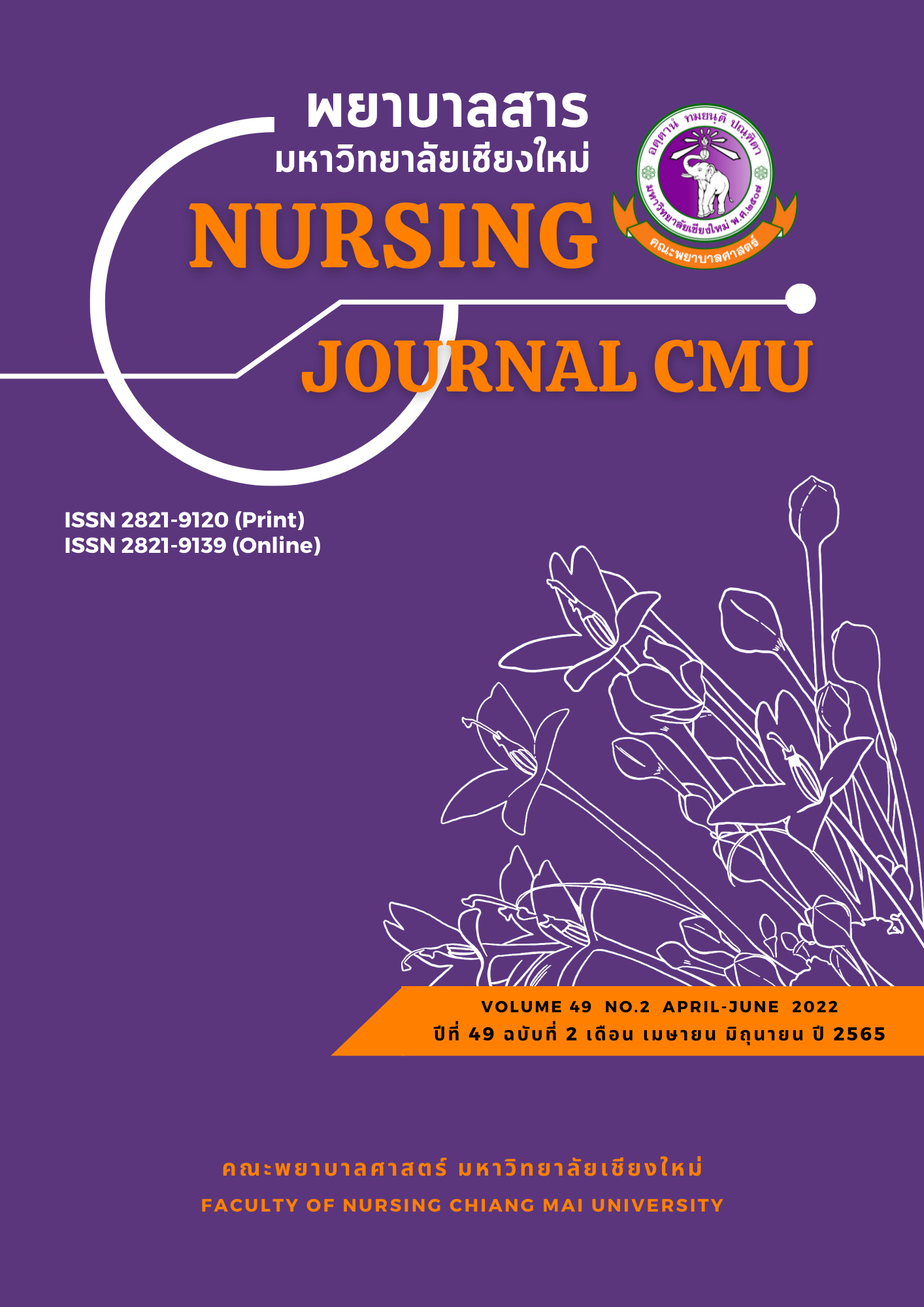ปัจจัยที่เกี่ยวข้องกับคุณภาพชีวิตของผู้ป่วยสะเก็ดเงินที่มารับการรักษาที่ห้องตรวจผู้ป่วยนอก โรงพยาบาลมหาราชนครเชียงใหม่
คำสำคัญ:
คุณภาพชีวิต, ผู้ป่วยสะเก็ดเงิน, ปัจจัยที่เกี่ยวข้องบทคัดย่อ
โรคสะเก็ดเงินเป็นโรคผิวหนังอักเสบเรื้อรัง ที่ทำให้ผิวหนังบริเวณใบหน้าและแขนขา ลอกเป็นขุยส่งผลต่อภาพลักษณ์ของผู้ป่วยทำให้เกิดภาวะเครียด แยกตัวจากสังคม และซึมเศร้า เป็นผลให้คุณภาพชีวิตแย่ลง การวิจัยเชิงพรรณนาหาความสัมพันธ์ครั้งนี้มีวัตถุประสงค์เพื่อศึกษาคุณภาพชีวิตและปัจจัยที่เกี่ยวข้องกับคุณภาพชีวิตของผู้ป่วยโรคสะเก็ดเงิน กลุ่มตัวอย่างได้แก่ผู้ป่วยสะเก็ดเงินที่ได้รับการวินิจฉัยเป็นโรคสะเก็ดเงิน และได้รับการประเมินระดับความรุนแรงของผื่นสะเก็ดเงินจากแพทย์ จำนวน 110 ราย ณ โรงพยาบาลมหาราชนครเชียงใหม่ เครื่องมือที่ใช้ในการรวบรวมข้อมูลประกอบด้วย 1) แบบบันทึกข้อมูลทั่วไปของกลุ่มตัวอย่าง 2) แบบประเมินความมีคุณค่าในตัวเอง มีค่าความเชื่อมั่นเท่ากับ .80 3) แบบสอบถามการประเมินภาพลักษณ์ของโฮปวูด เฟลทเชอร์ ลี และกาซาร์ (Hopwood, Fletcher, Lee,& Ghazal, 2001) มีค่าความเชื่อมั่นเท่ากับ .84 4) แบบประเมินความรู้การปฏิบัติเกี่ยวกับโรคสะเก็ดเงิน มีค่าความเชื่อมั่นเท่ากับ .7 และ 5) แบบประเมินคุณภาพชีวิตของผู้ป่วยโรคสะเก็ดเงิน ของลีนา จุฬาโรจน์มนตรี ป่วน สุทธิพินิจธรรมและ กนกวลัย กุลทนันทน์ (Chularojanamontri, Suthipinittharm, & Kulthanan, 2009) มีค่าความเชื่อมั่นเท่ากับ .82 วิเคราะห์ข้อมูลโดยใช้สถิติเชิงพรรณนาและหาความสัมพันธ์ด้วยสถิติสหสัมพันธ์เพียร์สัน
ผลการวิจัยพบว่ากลุ่มตัวอย่างมีคุณภาพชีวิตโดยรวมอยู่ในระดับดีร้อยละ 67.01 โดยปัจจัยด้านอายุมีความสัมพันธ์ทางลบระดับปานกลางกับคุณภาพชีวิต (r=-.464, p < .001) สถานภาพสมรสคู่มีความสัมพันธ์ทางลบระดับต่ำกับคุณภาพชีวิต (r=-.236, p < .001) ระดับการศึกษาสูงมีสัมพันธ์ทางบวกระดับต่ำกับคุณภาพชีวิต (r=.247, p=.015) ระดับความรุนแรงของโรค (PASI score) และตำแหน่งของร่างกายที่เกิดโรค (Body surface area involvement) มีความสัมพันธ์ทางบวกระดับปานกลางกับคุณภาพชีวิตอย่างมีนัยสำคัญทางสถิติ p<.001 (r = .481 และ .469) ตามลำดับ ส่วนการรับรู้ผลกระทบของภาพลักษณ์มีความสัมพันธ์ทางบวกระดับสูงกับคุณภาพชีวิต (r=.784, P<.001) และความรู้สึกมีคุณค่าในตนเองมีความสัมพันธ์ทางลบระดับปานกลางกับคุณภาพชีวิตของผู้ป่วยโรคสะเก็ดเงิน (r=-.505, P<.001)
ผลการศึกษานี้แสดงให้เห็นว่าการส่งเสริมความมีคุณค่าในตนเองและการรับรู้ภาพลักษณ์ในผู้ป่วยโรคสะเก็ดเงินอาจจะช่วยส่งเสริมให้ผู้ป่วยมีคุณภาพชีวิตที่ดี
เอกสารอ้างอิง
Cash, T. F. (2011). Cognitive-behavioral perspectives on body image. In T. F. Cash & L. Smolak (Eds.), Body image: A hand book of science, practice, and prevention (2nd ed.). New York: Guilford.
Cheewapoonpol, B. (2006). Relationship between personal factors, fear of reaction of significant persons, coping strategies, social support, and body image of post mastectomy patients. Kuakarun Journal of Nursing, 13(2), 9-12. (in Thai)
Chularojanamontri, L., Suthipinittharm, P., & Kulthanan K. (2009). The validity and reliability of psoriasis disability index (PDI). Thai Journal of Dermatology, 25(1), 141-52. (in Thai)
Finlay, A. Y., Khan, G. K., Luscombe, D. K., Salek, M. S. (1990). Validation of sickness impact profile and psoriasis disability index in psoriasis. British Journal of Dermatology, 1237, 51-56.
Hopwood, P., Fletcher, I., Lee, A., & Ghazal, S. A. (2001). A body image scale for use with cancer patients. European Journal of Cancer, 37(2), 189-97.
Innog, C. (1997). Self-care behavior and quality of life of the elderly in North Eastern Thailand, (Master’s thesis in Community Health Nursing). Mahidol University, Thailand.
Lauithaisong, N. (2011). Stress, impact assessment, and stress coping methods among psoriasis patients. Journal of Information and Learning, 22(3), 84-96.
Medical Records and Statistics Section, Maharaj Nakorn Chiang Mai Hospital. (2020). Statistics of dermatology patients at Maharaj Nakorn Chiang Mai Hospital. Chiang Mai: Author.
Pattamadilok, B. (2018). Psoriasis. Bangkok: Institute of Dermatology.
Polit, D. F., & Beck, C. T. (2004). Nursing research principle and methods (7th ed.). Philadelphia: Lippincott Williams & Wilkins.
Prasunnakarn, P. (2017). Prevalence and incidence of psoriasis in Udonthani Hospital. Udonthani Hospital Medical Journal, 25(2), 143-150.
Promjan, S., Wiriyapongsukit, S., Boonsoh, R., & Khongsin, N. (2017). Predictive power of self-esteem on quality of life among disabled people. The Southern College Network Journal of Nursing and Public Health, 4(1), 47-59.
Rojtrakul, P., Yamphak, R. & Inpaen, C. (2008). Clinical nursing practice guideline. (1st ed.). Bangkok: Queen Graphic & Printing Center.
Rosenberg, M., & Pearlin, L. (1978). Social class and self-esteem among children and adults. American Journal of Sociology, 84(1), 53-77.
Rosenberg, M. (1979). Conceiving the self. New York: Basic Books.
Seawthaweesin, K. (2018). Quality of life of psoriasis and family participation, Vachira Phuket Hospital. Region 11 Medical Journal, 32(3), 1069-1088.
Taejarernwiriyakul, O., Thongdonmuan, T., Prasanworakijkul, T., Buppan, P. & Sommatas, A. (2019). Factors related to quality of life in patients with psoriasis at hospitals located in Nakhon Nayok Province. Journal of Nursing and Health Care. 37(2), 143-147.
Thakolwiboon, S., Upala, S., Geeratragool, T., Benjatiku,l N., Uathaya, M., Tripipitsiriwat, A., … Jiamton, S.,(2013). The factors affecting quality of life in Thai psoriasis patients. The Journal of Medical Association of Thailand, 96(10), 1344-1349.
Yang, H. & Yang, K. (2015). Impact of psoriasis on quality of life in Taiwan. Dermatologica Sinica, 33(1), 146-150.
ดาวน์โหลด
เผยแพร่แล้ว
รูปแบบการอ้างอิง
ฉบับ
ประเภทบทความ
สัญญาอนุญาต
ลิขสิทธิ์ (c) 2022 พยาบาลสาร

อนุญาตภายใต้เงื่อนไข Creative Commons Attribution-NonCommercial-NoDerivatives 4.0 International License.
บทความที่ได้รับการตีพิมพ์เป็นลิขสิทธิ์ของวารสารพยาบาลสาร
ข้อความที่ปรากฏในบทความแต่ละเรื่องในวารสารวิชาการเล่มนี้เป็นความคิดเห็นส่วนตัวของผู้เขียนแต่ละท่านไม่เกี่ยวข้องกับมหาวิทยาลัยเชียงใหม่ และคณาจารย์ท่านอื่นๆในมหาวิทยาลัยฯ แต่อย่างใด ความรับผิดชอบองค์ประกอบทั้งหมดของบทความแต่ละเรื่องเป็นของผู้เขียนแต่ละท่าน หากมีความผิดพลาดใด ๆ ผู้เขียนแต่ละท่านจะรับผิดชอบบทความของตนเองแต่ผู้เดียว






